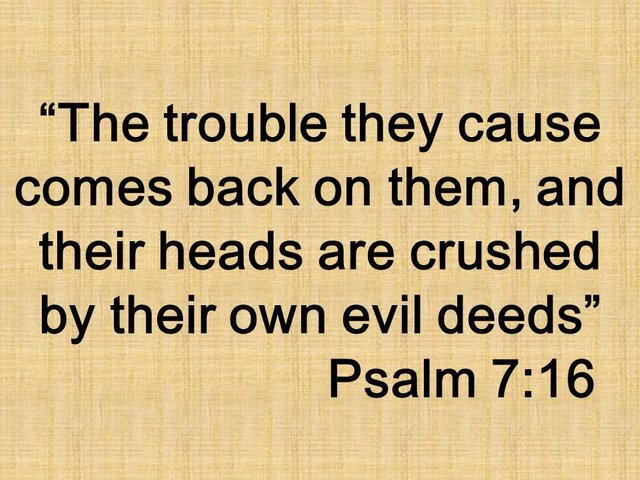The Psalm 7 is basically the prayer of a person who requests God's help against his enemies, recognizing God as the supreme judge of the universe. Faced with a human justice that suffers from many flaws, only God is the guarantor of a fair judgment, and so the Psalm affirms: "The Lord shall judge the nations; judge me, O Lord, according to my righteousness, and according to my innocence that is in me" Psalm 7:8. This part of the Psalm is very likely related to an ancient tradition of the people of Israel since the first temple of Jerusalem could be used as a court of last resort.
But then the Psalm has a second part where it mentions an ancient spiritual law that is also taught in the Books of Proverbs, Ben Sira, and Wisdom, the famous law of sowing and reaping. And this prayer has a spiritual meaning because the Psalm seeks to teach the readers of the Bible that God with his wisdom created a harmonious universe subject to ethical laws, and this famous law is one of them.
The law of sowing and reaping is a cosmic law of rewards and punishments, that is, it ensures blessings for the correct and assertive decisions and on the other hand establishes punishments for the erroneous actions; in short, this law is closely related to the idea of one's own responsibility.
This is why the Psalm wisely states that those who follow the path of error cannot receive the blessings of God, and with these words, the Psalm ends its teaching:
"An evil person is like a woman
about to give birth
to a hateful, deceitful,
and rebellious child.
Such people dig a deep hole,
then fall in it themselves.
The trouble they cause
comes back on them,
and their heads are crushed
by their own evil deeds" Psalm 7:14-16.

For more information visit my profile follow the link and download for free my ebook.
Authors get paid when people like you upvote their post.
If you enjoyed what you read here, create your account today and start earning FREE STEEM!
If you enjoyed what you read here, create your account today and start earning FREE STEEM!